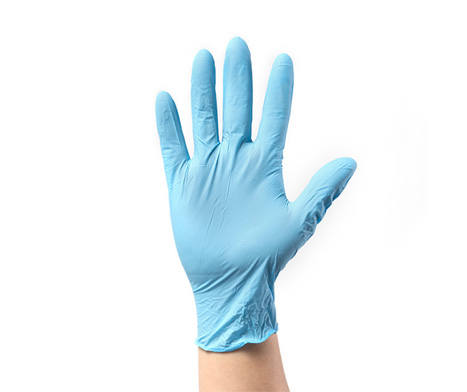Nitrile gloves are an important part of personal protective equipment (PPE) because they are protective, durable, easy to replace, affordable and latex-free. As a type of reliable disposable gloves, nitrile gloves uses include protecting hands from chemicals, biological materials, sharp objects and other hazards.
To help you make the right PPE choices, this article will describe what nitrile gloves are, what they are used for, what hazards they protect against, and how to choose the right ones for your application.
Nitrile gloves are a disposable, effective and inexpensive form of hand protection for workers in a variety of industries. The term nitrile is short for acrylonitrile-butadiene rubber. Unlike latex gloves, which are made from natural rubber, nitrile gloves are synthetic and do not contain latex. This means that nitrile gloves are a reliable alternative to PPE for anyone with latex allergies.
Nitrile gloves are durable and resistant to both punctures and chemicals. While manufacturing disposable nitrile gloves used to be an expensive process, modern advances in technology have led to new ways of producing them. Now, nitrile gloves are just as affordable as regular latex gloves. Because of the cost effectiveness and low allergy rating of nitrile gloves, many people choose them over latex gloves.

Nitrile gloves are personal protective equipment for a variety of industrial applications, providing the wearer with reliable hand protection against a range of potential hazards, including cutting, liquids and abrasive materials.
The comfort and convenience of nitrile gloves make them the preferred choice for industries that require prolonged use of personal protective equipment. They are also suitable for applications or jobs that are of short duration and require frequent glove changes.
Specifically, nitrile gloves uses are often seen in these environments:
-Medical work. Nitrile gloves are commonly used for medical purposes because they provide a two-way contact barrier when medical personnel are evaluating patients, handling biological materials or handling medical waste. From examinations and surgeries to dentistry and pharmaceuticals, nitrile gloves provide reliable hand protection for medical workers in a variety of specialties.
-Chemical labs. People who work in laboratories are often exposed to potentially hazardous materials. The chemical resistance of nitrile gloves makes them an effective way to protect these workers from hazardous chemicals and dangerous materials, such as organic solvents.
-Food Service. Nitrile gloves are safe for food handling and can provide additional protection for the wearer when preparing food. The easy interchangeability of nitrile gloves also makes them ideal for those in customer-facing roles who often need to change gloves frequently. In addition, utilizing the different colors of nitrile gloves can also help food-based businesses prevent cross-contamination.
Nitrile gloves prevent the wearer's hands from coming into direct contact with a range of hazardous and abrasive materials. In addition to protecting the wearer, nitrile gloves protect delicate materials being handled, such as electronics, metals and glass.
Specifically, nitrile gloves offer reliable protection from the following substances:
-Microorganisms: Nitrile gloves offer protection against many types of microorganisms, including bacteria, fungi and viruses. Because of this reliable protection, nitrile gloves are an excellent surgical grade medical glove.
-Weak acids: Nitrile gloves protect the wearer from weak acids, such as sulfuric and nitric acid. This resistance makes nitrile gloves versatile and useful in both the pharmaceutical and food industries.
-Some organic solvents: The resistance of nitrile lab gloves to many organic solvents make them suitable for use in laboratory work and various experiments.
If you need to buy nitrile gloves, feel free to shop at T-Safety.com. We offer high quality products and courteous service, contact us now and we will always be happy to help you.
Copyright © Hebei Sinotools Industrial Co.,Ltd. All Rights Reserved | Powered by  Sitemap
Sitemap